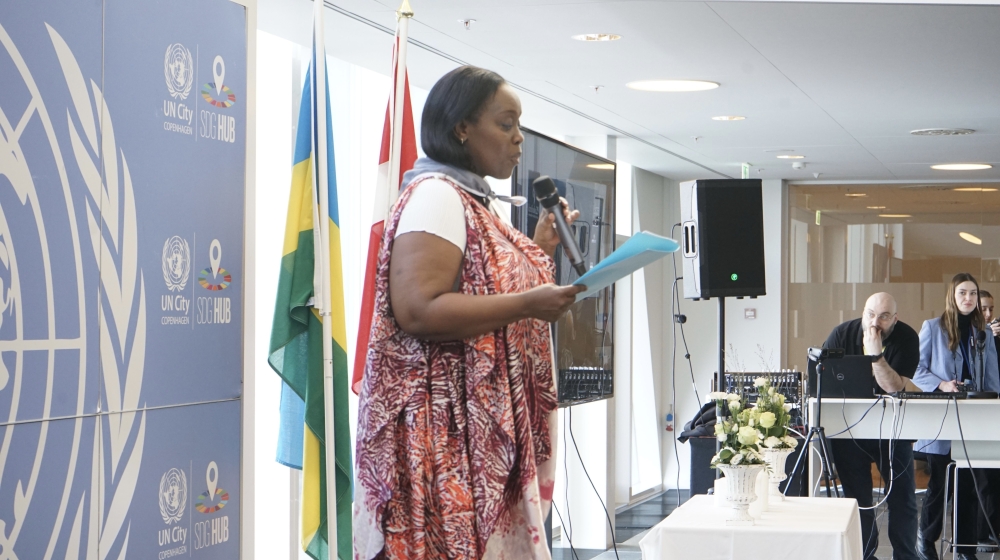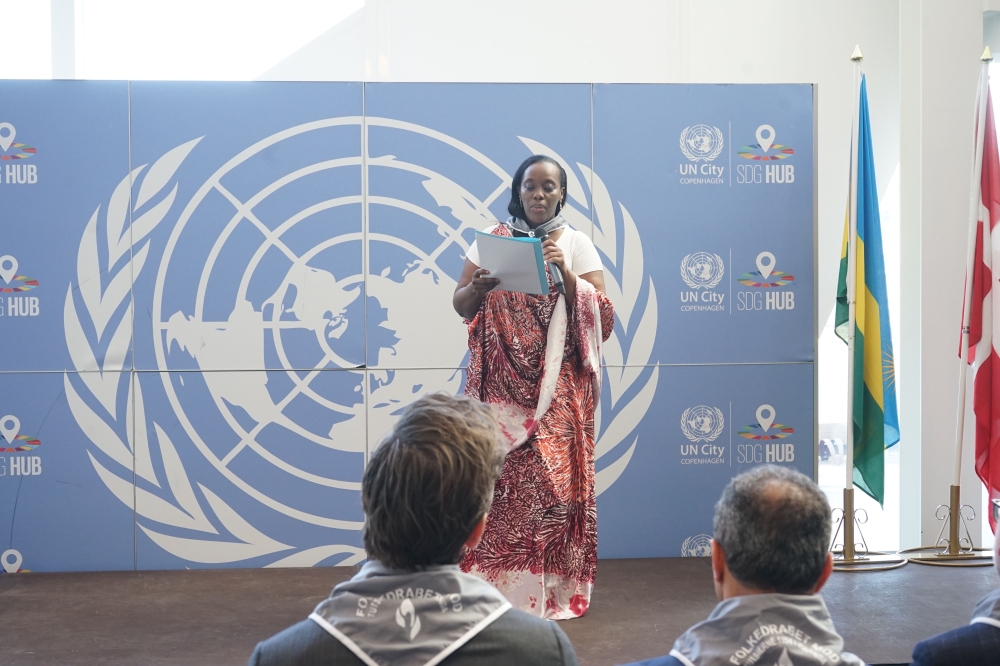

Regrettably, sympathizers of the perpetrators of the 1994 Genocide against the Tutsi in Rwanda and so-called experts from Western countries are openly defending the genocidaires, blessing their negationism, and, with no shame, distorting our history and daring to justify what is unjustifiable, the Ambassador of Rwanda to the Nordics, Diane Gashumba, said on April 13.
She was addressing fellow heads of mission, Rwandans living in Denmark and representatives of international organizations, at Auditorium III, UN City Building, in Copenhagen, during the 29th Commemoration of the 1994 Genocide against the Tutsi in Rwanda.


ALSO READ: Zimbabwe commits to bring perpetrators of 1994 Genocide against the Tutsi to justice
Gashumba said: "Even today, supposedly respectable media houses are openly blaming the victims for causing the genocide and ‘doing little to prevent it’. What these people forget is that something that exists can be hidden for a certain period of time, but it will always reappear, and the truth is the same. You can manipulate, distort the truth, hide it, but at some point, the truth will be known.”
On April 7, Rwandans and friends of Rwanda, the world over, started mourning and grieving, and paying tribute to the more than one million innocent Tutsi killed by a genocidal regime in 1994.
ALSO READ: International community should learn from 1994 Genocide against the Tutsi – Rwandan envoy
Although discrimination, humiliation, and killings had been ongoing since 1959, Gashumba noted, nothing could have prepared us for such atrocities.
"Innocent new-borns to elderly people were killed, women were raped, and this all happened under the watch of the international community with full support from the leadership of the country at that time. Nothing could have prepared us for all the steps of the Genocide against the Tutsi, including the phase we are facing today: denial, which is a continuation of the genocide itself.”
Today, she appealed, "as we light candles and observe a minute of silence in remembrance of the victims, let us renew our commitment” to building a world free from hate and violence.
"Let us unite against those who seek to divide us, and let us work towards a better future for all. The candles we light symbolize our continued remembrance. As this light shines bright, may their memories live on within us,” Gashumba said.
Rwanda chose path of truth, justice, and reconciliation
Rwanda has chosen the path of truth, justice, and reconciliation, Gashumba said, noting that this path does not mean that perpetrators of the 1994 genocide against the Tutsi will go without answering for their crimes, "absolutely not.”
"There should be no safe haven for genocidaires. Genocidaires must answer for their crimes against humanity, their crimes against the Tutsi. They cannot be allowed to escape justice and continue to haunt Rwandans now living abroad in countries that gave them a new start.”
She therefore thanked the Danish government for pursuing justice and holding perpetrators hiding in the country accountable for their crimes of genocide.
Denmark has provided close cooperation with Rwanda on the prosecution of genocide suspects.
ALSO READ: Denmark extradites Genocide suspect
IN July 2014, Danish authorities extradited to Rwanda Genocide suspect Emmanuel Mbarushimana, who was wanted for charges of genocide, complicity in genocide, conspiracy to commit genocide, murder and extermination, crimes allegedly committed in the former Muganza commune (district) in the then Butare prefecture. He had earlier been granted asylum under the false name of Emmanuel Kunda, and had lived in Denmark since 2001.
Mbarushimana became the second Genocide suspect to be extradited to Rwanda from Scandinavian countries after Charles Bandora, who was transferred from Norway.
READ ALSO: Denmark extradites Genocide fugitive Wenceslas Twagirayezu
Later, in 2018, Wenceslas Twagirayezu who was, among others, accused of commanding attacks on Busasamana Catholic Parish where more than 1,000 Tutsi were murdered, was extradited to Rwanda. Twagirayezu was the president of the extremist CDR party in the former Gacurabwenge Sector in the current Rubavu District. He was a militia leader in the area during the Genocide against the Tutsi.
Rwanda has strongly called on all actors to fight against genocide denial and hate speech as the latter are not only harmful but also dangerous since they can lead to the dehumanization of entire groups of people and ultimately to violence.
"It is our collective responsibility to promote mutual respect and understanding, and to build bridges between different communities.”
The Danish Minister for Immigration and Integration, Kaare Dybvad Bek, said that what unfolded in that short span of time was gruesome.
He said: "The 100 days in 1994 were one of the darkest chapters in our collective history. Today is a time to Remember. To Unite. And to Renew. Only by remembering, reflecting and committing to a better future, can we learn from history and honour the victims of genocide.
"Denmark stands with Rwanda in its continued efforts to unite as a country. Ensuring justice to victims and indictment of perpetrators are central in Rwanda’s search for healing and unity as a country and in bringing closure for families and friends of the many victims.”
A fair and transparent trial for those accused of taking part in the horrific actions of the Genocide is right for all parties, Dybvad said.
He added: "Rwandans are showing great determination to renew their country. While many challenges remain, Rwanda is making strong progress and has since 1994 taken impressive steps forward and away from the horrifying events 29 years ago.”
Niger stands in solidarity with Rwanda
In the UN City Building, Moussa Dourfaye, the Ambassador of Niger to the Nordic Countries who spoke as a representative of the Group of African Ambassadors based in Copenhagen, noted that it is important to acknowledge the pain and suffering of the survivors of the 1994 genocide and the families of those who lost their lives.
He said: "This commemoration serves as a call to action to prevent such atrocities from happening again. We must always remember that we are all human beings, and that we must treat each other with respect and dignity, regardless of our differences.
"We must also recognize the role that the international community played in failing to prevent or stop the genocide. It is a painful reminder of the importance of early warning, conflict prevention, and timely intervention in situations of mass atrocities.”
Further, Dourfaye said, the events of 1994 should serve as a reminder that genocide is a real and present danger, and "we must remain vigilant” in preventing its occurrence.
"We must work together to promote social cohesion, tolerance, and respect for diversity, as well as combat the hate speech and discrimination that fuel genocidal violence. As an African nation, Niger stands in solidarity with Rwanda and the international community in condemning the atrocities that were committed during the genocide.
"We believe that it is our collective responsibility to ensure that such heinous crimes against humanity never happen again. We must learn from the past and work towards a future where respect for human rights, dignity, and justice is upheld for all.”


